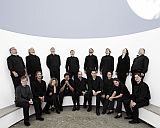
Right from the start the repertoire of the ensemble featured a wide range. At the opening concert, works by Ager himself were played, as well as compositions by contemporaries such as Luciano Berio and Vinko Globokar. Even compositions of the Second Viennese School were not missing. When Ager started the Salzburg Aspekte Festival in 1977, the oenm significantly contributed to the programme, and at the same time pursued a busy international concert career. Herbert Grassl, who took over as the director of the ensemble in 1988 , introduced the use of public space, when he, along with the visual artist Otto Beck, initiated the sound mobiles: on recordable tricycles none other than John Cage was chauffeured from the airport to the festival city as part of the Aspekte Festival in 1991 . These sound mobiles were also used in other cities such as Maastricht, Bolzano and Seoul. Besides the Aspekte Festival, the oenm have earned a permanent place in festivals of Bregenz, Salzburg, Vienna and beyond Austria’s borders.
Another change followed in 1997 when John Kalitzke was invited as a guest conductor, and Frank Stadler and Peter Sigl took over as artistic directors. The latter two form part of the Stadler Quartet, the hard core of the ensemble, while dealing with the extensive repertoire of both the new and the somewhat older music. Also other musicians of the ensemble are not only proficient in the field of contemporary music, but are also active in classical orchestras and early music ensembles. And so it is now a feature of the oenm, that it is dedicated to these diverse influences of contemporary music and also sets its own impulses to the impetus of its expansion. In the cycle of the 2008-09 season, the focus was placed on folk music instruments from the Salzburg area and composers from other countries were commissioned to write pieces for the specific Salzburg instruments such as zither, dulcimer, guitar, and folk harp, as a solo instrument in combination with the traditional ensemble instruments. In this manner, the idea was to give room for folk music instruments in contemporary music.
For the current season, the ensemble found a new way of programming. The instrumentalists do not only have the role of interpreting musicians, but are also called up for programming – every evening of the cycle is designed by a different ensemble member. This not only leads to an individual process. Synergy effects are set free, when the responsible musicians convey their colleagues during rehearsals or explain the compositions at the concerts to the public. But the musicians also take on mediation in other aspects. At the annual academies at the Mozarteum, they teach the music students about playing contemporary music and give insights on their interpretations. In addition, the new year brings a further field of experimenting: in the artist’s studio of the Künstlerhaus in Salzburg, the oenm has the opportunity to test new performance concepts on a relatively small scale and engage in direct interaction with the audience.
Doris Weber Berger
translated from the German by Doris Miyung Brady
Upcoming concerts:
01/22/2011 University Mozarteum, Solitär, Salzburg. Start: 3 p.m. (as part of the Mozart Week 2011)
03/06/2011 University Mozarteum, Solitär, Salzburg. Start: 7:30 p.m.
03/12/2011 ARGEkultur Salzburg. Start: 4 p.m.
03/13/2011 Mozarteum, Large Hall, Salzburg. Start: 7:30 p.m.
03/18/2011 University Mozarteum, Solitär, Salzburg. Start: 7:30 p.m.
03/20/2011 republic, Salzburg. Start: 7:30 p.m.
03/25/2011 University Mozarteum, Solitär, Salzburg. Start: 7:30 p.m. (all concerts at the Festival Salzburg Bienniale 2011)
